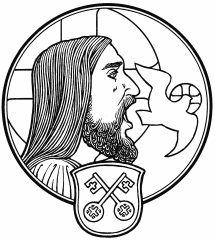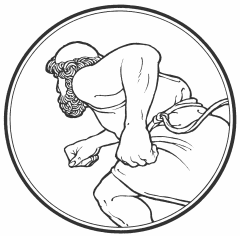 Grace, mercy, and peace to you from God our Father, and from our Lord and Savior, Jesus Christ, amen. The text for the sermon is the Gospel, which was read earlier.
Grace, mercy, and peace to you from God our Father, and from our Lord and Savior, Jesus Christ, amen. The text for the sermon is the Gospel, which was read earlier.
Following Christ’s death and resurrection, the atmosphere of the disciples had changed. They locked themselves in a room to protect themselves from the Jews. Judas was dead and Thomas was nowhere to be found. Hard to believe, but these were the men who went out with Jesus, who were taught by Him and later were sent out in His name. Though they were confused on what to do next, that was about to change.
Suddenly, Christ appeared in the locked room and the His sudden appearance filled them with wonder and awe. The words that He speaks are not just empty words, void of meaning. Rather, they are pure Gospel, an absolution, a declaration that all is well. Four simple words put the fears of the disciples to rest: “Peace be with you.” His appearance, His showing of the wounds in His hands and side, showed His suffering and resurrection, showing that with these wounds, His blood is shed for many, that sin and death no longer had dominion over creation.
This first time that Jesus speaks peace to them, He speaks in terms of forgiveness giving peace from fear. It is a joyful assurance, the presence of God, the complete opposite of fear. Yet just days ago on Good Friday, there was no peace for the disciples. All of them had left Jesus in fear, especially Peter. They were deathly afraid the Jews would come for them too. That’s why the doors were locked. What is worse is now they have no leader to make them feel more secure.
Christ returned from death to give peace from fear. He gives to us His forgiveness. He gives to us His peace. It is that peace that passes all human understanding. It is peace in Christ which only He can give. He gave it to the disciples on Maundy Thursday when He instituted His Supper and He gives that peace to you each time you come and receive His body and blood. Christ has come to give us all peace, that peace of knowing that our sins have been forgiven.
Startled as they were, Jesus says to them again, “Peace be with you. As the Father has sent me, even so I am sending you.” What is it that Jesus is saying to them? The Savior not only assures them of peace, but He also commissions them to announce peace to the world. Peace comes from forgiveness of sins. It is peace between God and men through the work of Christ. It is peace of conscience to the sinner. This peace was Jesus’ way of saying that these idlers were still precious – and useful – to him. Jesus’ word of peace was their forgiveness, and now they had the power to share that same forgiveness with the world.
During this first meeting, the disciple Thomas was not present. When the disciples saw Thomas next, they told him how Jesus had appeared to them in the locked room. Thomas, known for his doubting, refused to believe unless he saw everything for himself.
It’s really not fair to pick on Thomas just because he missed church, but that’s what we do today. It’s not fair because all the other disciples doubted just as much as he did. In fact, the Easter Gospel told us about the disciples’ reaction when the women came and told them about the empty tomb and the angels. It said, “The women … told these things to the apostles, but these words seemed to them an idle tale, and they did not believe them.” You see, if Thomas is Doubting Thomas, then Peter is Doubting Peter, James is Doubting James, John is Doubting John, and so on. Every one of the disciples doubted, not just Thomas.
Martin Luther once wrote that the devil’s greatest and deadliest arrow in his evil quiver is the arrow of doubt, which he fires with deadly sniper precision into the hearts of all believers in Christ. Thomas and the disciples were not immune to this. You and I are not immune to this either. Don’t we doubt that God will do what He says He will? Don’t we doubt the gifts that God gives to us in His Sacraments of Holy Baptism and the Lord’s Supper?
As Thomas appears with the 10 the following Sunday, Thomas wasn’t going to miss church this week, Jesus again appears to them and once again says “Peace be with you.” Then Jesus said to Thomas, “Put your finger here, and see my hands; and put out your hand, and place it in my side. Do not disbelieve, but believe.” Jesus knew exactly what it would take for Thomas to believe. He shows Him the wounds and Thomas believes.
You and I do not have the luxury of gazing upon the resurrected Jesus and believing as did Thomas. Instead, we receive the gift of the Holy Spirit which creates faith in us. It’s one thing to see and believe, but a complete other to believe solely based upon faith and without seeing. That’s us. That’s the Church today. Centuries after Christ’s death, people believed and continue to believe today. They did not have Christ to hold their hands as did the disciples, or to show His wounds to strengthen their weak faith as did Thomas. No, they believed based upon the faith that was granted to them by the Holy Spirit. They were able to confess with Thomas, just as we are: “My Lord and my God!”
We have been given this wonderful gift of faith, the ability to believe what Christ did for us on Calvary’s cross, and now we see that because of that action, we are given life in His name. To those who believe receive redemption, salvation, and eternal life through Jesus Christ. This comes to us in the gift of Baptism, where we have God’s name placed upon us. This comes to us in the gift of the Lord’s Supper, where we feast upon the body and blood of Jesus and receive His forgiveness. It comes to us each time we hear the words of Absolution pronounced over us. It will come to us again when we leave this world and enter into the heavenly mansion prepared for us.
We have received life and received it abundantly. Given to us so that we may live, one life had to be sacrificed, and that life is Jesus Christ. The peace of Christ is with us. It comes to us when we are forgiven. It comes to us as we believe in Christ and all that He has done for us. New life is given to us, a life that is not deserved, but given to us with nothing done on our part. This new life washes over us and we are made clean by the blood of the Lamb, shed for the sins of the many, including you and me. Dear friends in Christ, “Peace be with you.” Amen. Now the peace of God that passes all understanding, keep your hearts and minds through faith in Christ Jesus, amen.








